Get free scan and check if your device is infected.
Remove it nowTo use full-featured product, you have to purchase a license for Combo Cleaner. Seven days free trial available. Combo Cleaner is owned and operated by RCS LT, the parent company of PCRisk.com.
What is global-best[.]net?
Global-best[.]net is a rogue website, designed to cause undesirable redirects to compromised, possibly malicious sites and for the promotion of highly dubious content. There are thousands of rogue sites out there (for example, prioritynotifications.com, mediasource.online, viralupdatestoday.com, etc.) and they share many similarities in-between.
Intentional access to global-best[.]net is rare, most of its visitors get redirected to it. These redirects are mainly caused by intrusive advertisements and by PUAs (potentially unwanted applications). It should be noted that these apps can infiltrate devices without user consent and/or knowledge.
PUAs cause redirects, deliver intrusive ad campaigns (e.g. pop-ups, banners, coupons, etc.) and some can even track data.
![global-best[.]net pop-up redirects](/images/stories/screenshots201906/global-bestnet-homepage.jpg)
Rogue sites are promoted by invasive adverts, once clicked redirecting users to global-best[.]net and the like. Additionally, these websites are spread by PUAs opening new browser tabs/windows and causing redirects. The global-best[.]net website operates by firstly checking visitors' IP (Internet Protocol) addresses, in order to find out their geolocations.
This information is crucial to its further course of action. Once known, the site either redirects users elsewhere or begins feeding them questionable material. Either way, visitors are guaranteed to encounter malicious content, therefore visiting global-best[.]net is strongly discouraged.
This rogue website also misemploys browser notifications, which if allowed - begin running intrusive ad campaigns. However the consent option is disguised with click-bait (for example: "click here to get latest/viral news/videos/articles", "click here to verify that you're not a robot", "your page is loading, click here to continue" and etc.).
Invasive advertisements are considered a threat, due to the unreliable/malicious sites they redirect to and some can even execute scripts designed to autonomously download/install PUAs. As previously mentioned, such rogue applications can cause unauthorized redirects and run intrusive ad campaigns.
By using a variety of tools, they enable third party graphical content. Hence, the adverts they deliver (pop-ups, banners, coupons and etc.) can negatively affect the browsing experience: limit speed and cover original site content. Another ability some undesired apps possess is data tracking.
Monitoring user browsing activity (browsing and search engine history) allows them to gather personal information (IP address, geolocation, identity details). All PUAs are designed to generate revenue for their developers, the data-tracking kind do so by selling information.
Therefore it is not unlikely that users' personal information could end up in the hands of cyber criminals, even culminate in identity theft. In conclusion, presence of PUAs in one's device can lead to serious system and browser infections, as well as severe privacy and identity issues. To ensure device and user safety, all rogue applications should be eliminated immediately.
| Name | global-best.net pop-up |
| Threat Type | Push notifications ads, Unwanted ads, Pop-up ads |
| Serving IP Address | 34.231.89.205 |
| Symptoms | Seeing advertisements not originating from the sites you are browsing. Intrusive pop-up ads. Decreased Internet browsing speed. |
| Distribution Methods | Deceptive pop-up ads, potentially unwanted applications (adware) |
| Damage | Decreased computer performance, browser tracking - privacy issues, possible additional malware infections. |
| Malware Removal (Windows) |
To eliminate possible malware infections, scan your computer with legitimate antivirus software. Our security researchers recommend using Combo Cleaner. Download Combo CleanerTo use full-featured product, you have to purchase a license for Combo Cleaner. 7 days free trial available. Combo Cleaner is owned and operated by RCS LT, the parent company of PCRisk.com. |
PUAs are innumerous and share many corresponding traits. To further their malicious product, designers attempt to make PUAs appear legitimate and useful. By offering "beneficial" and "practical" features, they can trick users into installation.
However, it must be stressed that most of these features are nonfunctional, as PUAs serve only the purpose of creating profit for their designers. In other words, instead of functioning as promised, these applications cause redirects, deliver advertisement campaigns and track data.
How did adware install on my computer?
Most PUA invasions occur through program install packs/bundles. "Bundling" is a false marketing method, by which regular software is packed along with unwanted applications. While opting-out from installing these additions can be possible, the options tend to be buried within numerous install windows and the "Custom/Advanced" settings.
Users who tend to move through the installation process quickly and not follow proper procedure - endanger themselves to PUA infiltrations and all the risks they themselves carry.
These apps are also furthered by invasive advertisements. When clicked they can execute scripts to initiate unauthorized downloads/installs of PUAs. In summary, undesired applications invade systems due to user inexperience and carelessness when browsing and installing programs.
How to avoid installation of potentially unwanted applications?
Users should always use official and verified sources for their software downloads (ideally, via direct download links). It is ill-advised to use third party downloaders as they are deemed untrustworthy and are more likely to provide bundled installation packs.
When installing programs, it is recommended to study terms and use "Custom/Advanced" settings, also to opt-out/decline any supplementary applications/features. Browsing recommendations include avoiding suspicious websites and advertisements.
It should be noted that intrusive adverts tend to look utterly ordinary and harmless, intentionally designed this way to lure more users into clicking them. However the sites they redirect to (gambling, pornography, adult-dating and hundreds of other examples) - are more obvious in their unreliability.
After encounters with such ads/redirects users are strongly advised to inspect their devices for dubious applications and/or browser extensions/plug-ins, upon detection - followed up with immediate removal. If your computer is already infected with rogue applications, we recommend running a scan with Combo Cleaner Antivirus for Windows to automatically eliminate them.
Appearance of global-best[.]net website (GIF):
![global-best[.]net website appearance (GIF)](/images/stories/screenshots201906/global-bestnet-appearance.gif)
Instant automatic malware removal:
Manual threat removal might be a lengthy and complicated process that requires advanced IT skills. Combo Cleaner is a professional automatic malware removal tool that is recommended to get rid of malware. Download it by clicking the button below:
DOWNLOAD Combo CleanerBy downloading any software listed on this website you agree to our Privacy Policy and Terms of Use. To use full-featured product, you have to purchase a license for Combo Cleaner. 7 days free trial available. Combo Cleaner is owned and operated by RCS LT, the parent company of PCRisk.com.
Quick menu:
- What is global-best.net pop-up?
- STEP 1. Remove spam notifications from Google Chrome
- STEP 2. Remove spam notifications from Google Chrome (Android)
- STEP 3. Remove spam notifications from Mozilla Firefox
- STEP 4. Remove spam notifications from Microsoft Edge
- STEP 5. Remove spam notifications from Safari (macOS)
Disable unwanted browser notifications:
Video showing how to disable web browser notifications:
 Remove spam notifications from Google Chrome:
Remove spam notifications from Google Chrome:
Click the Menu button (three dots) on the right upper corner of the screen and select "Settings". In the opened window select "Privacy and security", then click on "Site Settings" and choose "Notifications".
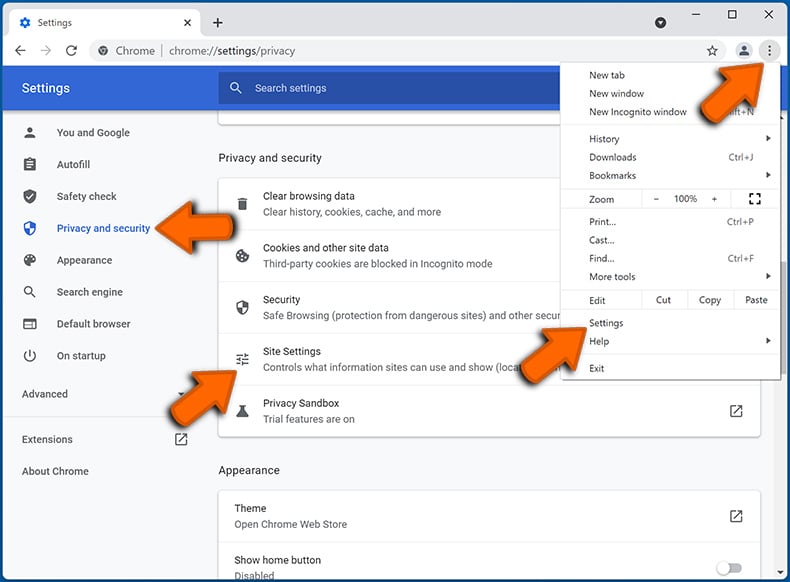
In the "Allowed to send notifications" list search for websites that you want to stop receiving notifications from. Click on the three dots icon near the website URL and click "Block" or "Remove" (if you click "Remove" and visit the malicious site once more, it will ask to enable notifications again).
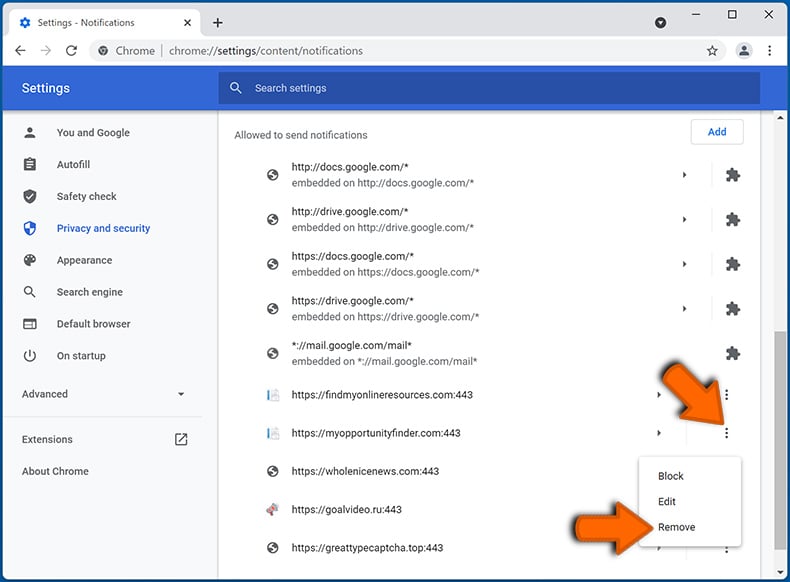
 Remove spam notifications from Google Chrome (Android):
Remove spam notifications from Google Chrome (Android):
Tap the Menu button (three dots) on the right upper corner of the screen and select "Settings". Scroll down, tap on "Site settings" and then "Notifications".
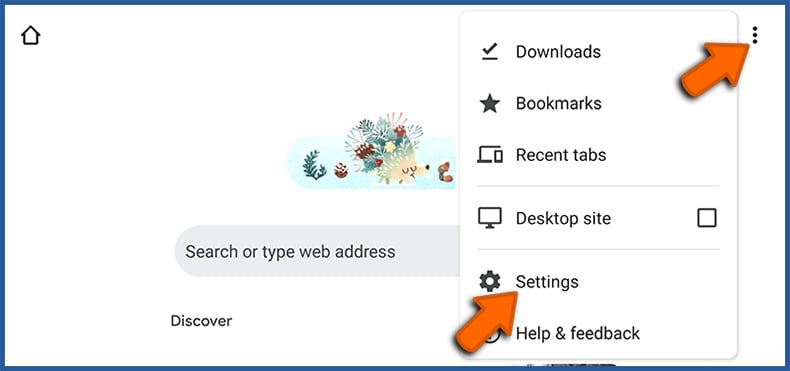
In the opened window, locate all suspicious URLs and tap on them one-by-one. Once the pop-up shows up, select either "Block" or "Remove" (if you tap "Remove" and visit the malicious site once more, it will ask to enable notifications again).
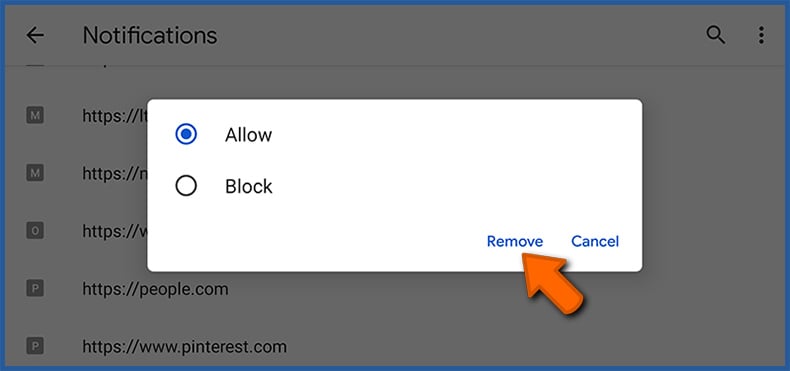
 Remove spam notifications from Mozilla Firefox:
Remove spam notifications from Mozilla Firefox:
Click the Menu button (three bars) on the right upper corner of the screen. Select "Settings" and click on "Privacy & Security" in the toolbar on the left hand side of the screen. Scroll down to the "Permissions" section and click the "Settings" button next to "Notifications".
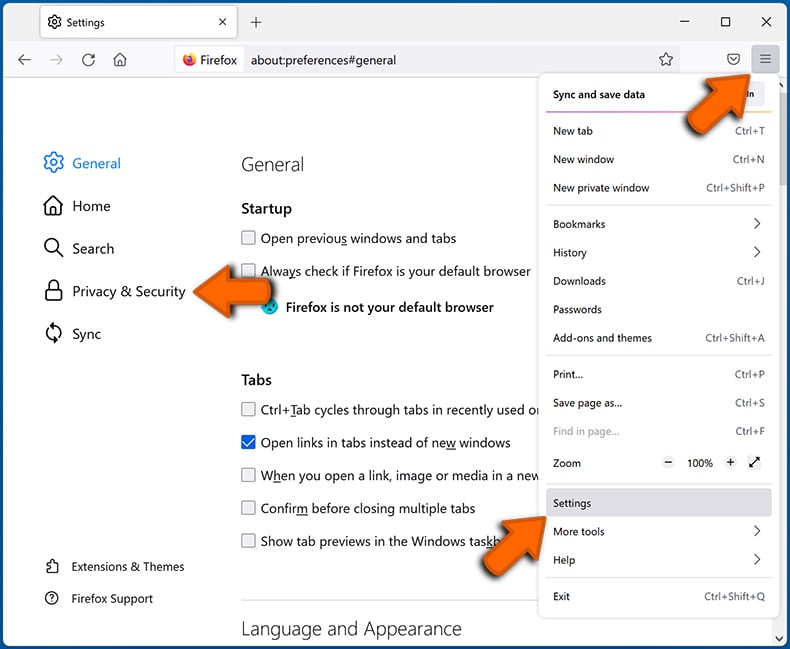
In the opened window, locate all suspicious URLs and block them using the drop-down menu or either remove them by clicking "Remove Website" at the bottom of the window (if you click "Remove Website" and visit the malicious site once more, it will ask to enable notifications again).
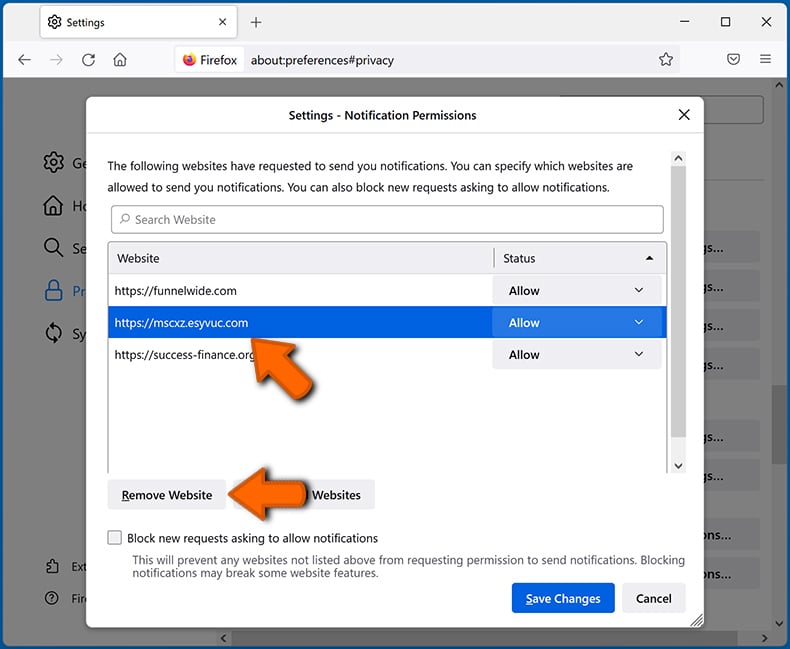
 Remove spam notifications from Microsoft Edge:
Remove spam notifications from Microsoft Edge:
Click the menu button (three dots) on the right upper corner of the Edge window and select "Settings". Click on "Cookies and site permissions" in the toolbar on the left hand side of the screen and select "Notifications".
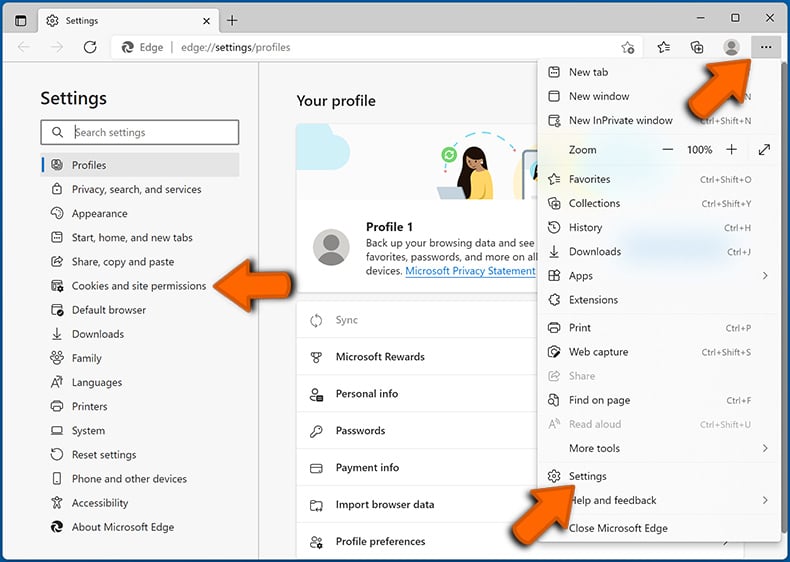
Click three dots on the right hand side of each suspicious URL under "Allow" section and click "Block" or "Remove" (if you click "Remove" and visit the malicious site once more, it will ask to enable notifications again).
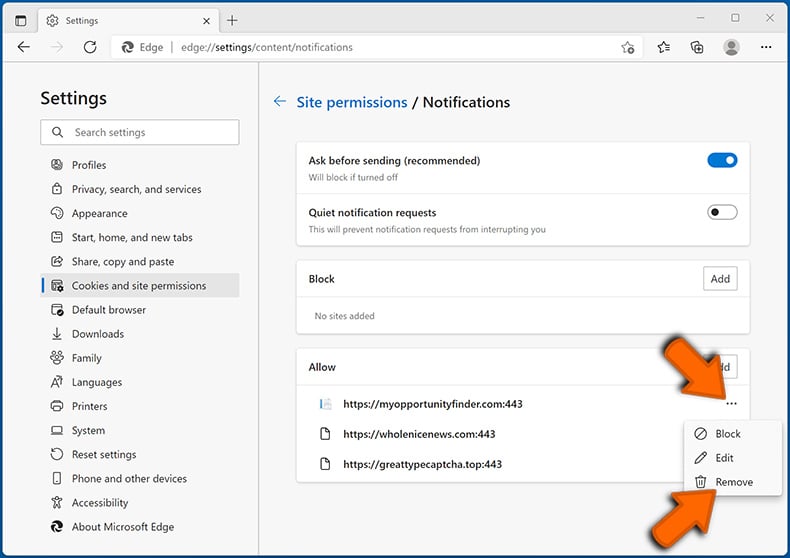
 Remove spam notifications from Safari (macOS):
Remove spam notifications from Safari (macOS):
Click "Safari" button on the left upper corner of the screen and select "Preferences...". Select the "Websites" tab and then select "Notifications" section on the left pane.
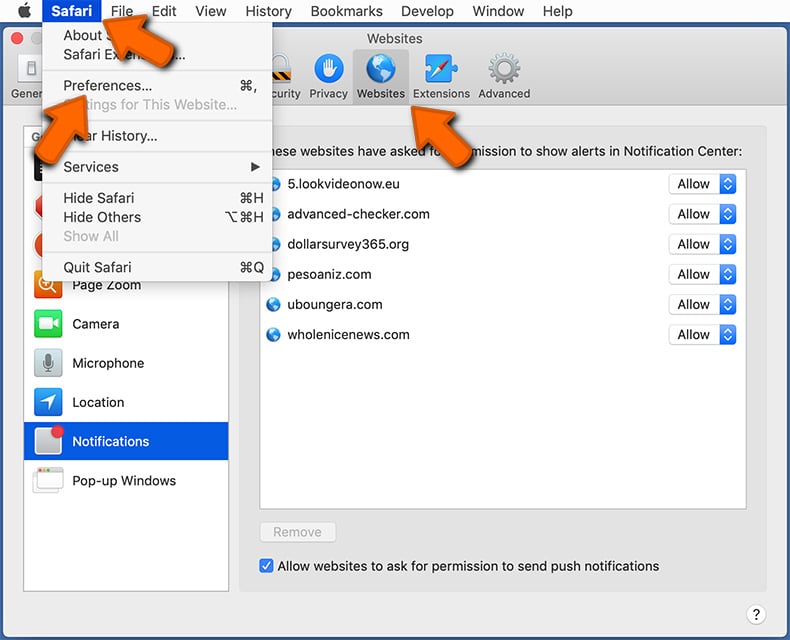
Check for suspicious URLs and apply the "Deny" option using the drop-down menu or either remove them by clicking "Remove" at the bottom of the window (if you click "Remove" and visit the malicious site once more, it will ask to enable notifications again)
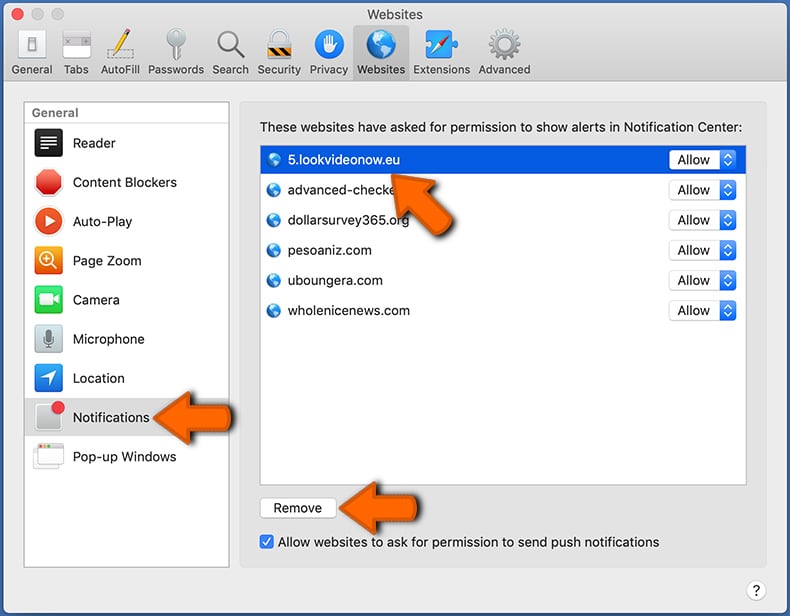
How to avoid browser notification spam?
Internet users should be very skeptical when being asked to allow notifications. While this is a useful feature that allows you to receive timely news from websites you like, deceptive marketers frequently abuse it.
Only allow notifications from websites that you fully trust. For added security - use an anti-malware application with a real-time web browsing monitor to block shady websites that tries to trick you into allowing spam notifications. We recommend using Combo Cleaner Antivirus for Windows.
Share:

Tomas Meskauskas
Expert security researcher, professional malware analyst
I am passionate about computer security and technology. I have an experience of over 10 years working in various companies related to computer technical issue solving and Internet security. I have been working as an author and editor for pcrisk.com since 2010. Follow me on Twitter and LinkedIn to stay informed about the latest online security threats.
PCrisk security portal is brought by a company RCS LT.
Joined forces of security researchers help educate computer users about the latest online security threats. More information about the company RCS LT.
Our malware removal guides are free. However, if you want to support us you can send us a donation.
DonatePCrisk security portal is brought by a company RCS LT.
Joined forces of security researchers help educate computer users about the latest online security threats. More information about the company RCS LT.
Our malware removal guides are free. However, if you want to support us you can send us a donation.
Donate
▼ Show Discussion